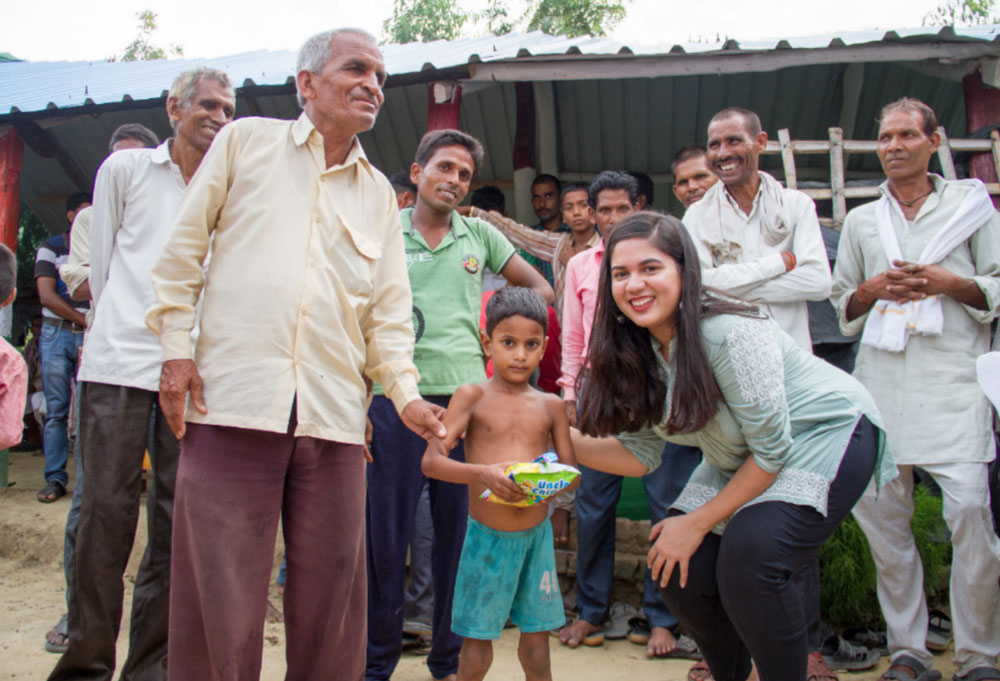A published author before the age of 17, Mishti Mitra ’20 might have rested on her laurels. Instead, she headed a project to install solar panels in a small town in India.
In the summer of 2017, Mitra, a philosophy and classics double major, traveled to India. Her goal: to provide energy through microcontroller-based solar panels to an off-the-grid area in Uttar Pradesh. As a winner of a $10,000 grant from the Davis Projects for Peace nonprofit organization, she had done her research. And she had a good contact in the area, Om Prakashni Charitable Society, a local NGO.
However, trouble dogged her efforts at the beginning.
An early monsoon season forced her to move the project deadlines up, which meant less time to develop solid relationships with the villagers. Their goodwill and participation were necessary, because the project is sustainable — each villager makes small payments into the system to keep the solar panels in good working order and the electricity flowing.
Despite her best efforts, and those of her partners, Mitra was not able to make that happen. She tried to move the project to a different village with similar needs, but the cost of moving the project proved to be too high.
Then good fortune struck in the form of retired engineer Rakesh Goyal. After reading an article about her project in the Hindustan Times, Goyal wanted to help. He introduced Mitra to Aman Aggarwal, owner of SATV Solar. Aggarwal proposed a model that would allow Mitra’s clients to use two light bulbs, charge a mobile phone and use a fan for ten hours — all at half the cost of the microcontroller-based solar panels she had originally planned for.
“With their help, we held several information workshops and then provided solar energy to forty households in several off-grid villages,” says Mitra. “SATV Solar made the model more economically favorable for the villagers, which increased the number of people in the program.”
Having a deep understanding of life in these small Indian towns is foundational to Mitra’s drive to help others.
Mitra was even able to retain the self-sustainable model for the project, along with its ability to perpetuate itself. “We have received monthly installments from all our clients — despite the poor weather conditions in the area, which lowered the performance of the solar panels. At the end of every two years, we will have the ability to equip forty more households with solar energy from the monthly payments by the project beneficiaries.”
Having a deep understanding of life in these small Indian towns is foundational to Mitra’s drive to help others. And that profound knowledge is embedded in her novel, Belief, about a tender relationship between and grandfather and granddaughter.
Mitra never knew her grandfathers, who had died before she was born, but she knows that relationships are the bedrock of Indian families, and she has a great capacity to imagine the possibilities.
“I always thought about what that relationship would have been like,” she says. “I used to have conversations with my father that in my imagination I would have had with my grandfather.
“I dedicated this book to my mother,” Mitra said. “She married at the age of 18 and had me at 19. She is so adventurous, I felt like she missed out on something. I based one of the main character, Sophia, on her.”
In addition to writing the book, Mitra learned quite a bit about the publishing world.
“Age is a decisive factor in India, young people are not thought to be mature enough to produce literature outside the young adult genre,” says Mitra, who was not yet 17 when her book was published. And her publishers must be happy they took the chance on Mitra. Belief was shortlisted for the International Young Author Awards.

